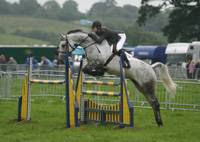
You hear many descriptions of the British as being "a nation of mongrels" and I suppose to a certain degree, that is probably a pretty fair description of the majority of the population of the British Isles (even though very few of us would EVER want to admit it).
I mean, we were invaded enough times by so many different peoples to cause so much of a mix of genes that are there REALLY likely to be many of us who can claim to be "pure Brits"?
But before going down that whole route, wouldn't "Anglo-Celtic" have been a better description for us as a combined race, rather than Anglo-Saxon? The Celts were around a lot longer so why do they get no mention in our heritage when we describe our race to the rest of the world?
What made me start this train of thought was a conversation I had with a friend in America, when I started talking about the English, Welsh, Irish and Scottish. He thought we were all just "one lot of people" and didn't realise we had so many different "national" identities.
My response kind of shocked him a little, and I realised I'd been pretty vehement in my denial of having any Welsh blood and probably no "English". We do get pretty defensive if someone doesn't acknowledge our (perceived or otherwise) origins.
So I am going to try and break it down a little for anyone wondering about "us lot over here".

The Celts. The start of our roots?
So, we must first go back to go forward, to a time shortly after the last ice age and our hunter-gatherer Mesolithic past (8000 –4000 BC).

Iberian hunter/gatherers moved through France and lower Britain and finally entered Scotland around 7000BC. Isn't it amazing that the very first of these people would have actually walked across what is now the English Channel, between France and the south coast of England?
The islands off the West coast of Scotland give us further evidence of the movement of these Mesolithic people, by the finds of large shell mounds and various tools such as fish hooks and harpoons. But artefacts from this period are quite rare.
This then leads me off at a slight tangent...., as not only did we have Celtic origins, there were also a whole other race of people to take into account. The people we know as "The Picts" up in Scotland.
Who were The Picts?
The years 2500 – 700 BC saw the entrance of the Beaker People from Northern and Central Europe and the start of Scotland’s Bronze Age. The beaker people are known by this name for the remains of their dead being cremated and buried in pots and interred in single graves, unlike the Neolithic people who buried their dead in groups. It is also recognised that the beaker people were the ones to introduce metalwork to Scotland. There is no record of any conflicts between the two peoples in Scotland although their lifestyles were very different in many ways. That leads to the theory that the Picts were an aboriginal race and non-Celtic. The difference in language must also be taken into consideration with this theory, as it is believed that the Picts did not speak with a Celtic tongue.

The Picti (or "Painted People") were named as such by the Roman Eumenius in 297 AD. These fierce warrior tribes, certainly north of the Antonine wall, indeed appeared to be non Celtic in their origin.
Next we have the controversial area of language.

Doesn't it stand to reason that if the Picts spoke a form of Celtic, at least some of the spoken word would be the same? This does not seem to be the case, as St Columbus biographer states that the Irish saint needed an interpreter when he preached to the Pictish King Brudei in 565 AD on the banks of Loch Ness.
 The ‘Ogham’ (the written language of the Picts found carved on some of the standing stones in Pictland) is also shrouded in doubt. Although the markings are similar to that of the Celts, the script is not in Celtic context and is barely, if at all, decipherable.
The ‘Ogham’ (the written language of the Picts found carved on some of the standing stones in Pictland) is also shrouded in doubt. Although the markings are similar to that of the Celts, the script is not in Celtic context and is barely, if at all, decipherable.So, that's got the first 2 of our potential ancestral candidates out of the way. Watch this space for part 2.





